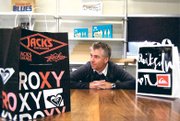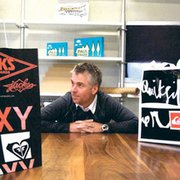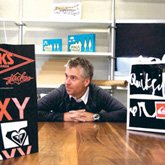The Proof Is in the Packaging
To find Earthpack’s eco conscience, you don’t need to look beyond the bag.
Twenty years ago—when, for many, green was just a color—Dave Bock took an idea from a college business class and turned it into a profitable packaging enterprise using recycled materials. His Irvine, Calif.–based company, Earthpack, provides custom-designed recycled bags, boxes and packaging materials to retailers looking for eco-friendly solutions to their branding needs.
The company’s clients include specialty surf shops and retailers, 17 national parks, and Angel Stadium of Anaheim, Calif., plus other professional-sports venues. Part of Bock’s eco mission is to support local environmental causes such as the Surfrider Foundation. California Apparel News recently caught up with Bock to discuss all things green.CAN: What’s the difference between your bag and a generic paper or plastic bag?DB: The biggest difference between Earthpack’s bags—both paper and plastic—is that there has been consideration behind how each product will affect the environment and how we can make it better. Whether it’s looking at the wasteful plastic pallet wrapping and thinking “Hey, we can use that again to make our plastic bags” or establishing relationships nationwide with bag producers and vendors to ensure that we aren’t traveling unnecessary distances to deliver our products, Earthpack practices what we preach. To put it simply, Earthpack’s bags are made from recycled and reclaimed materials for environmentally conscious retailers.
CAN: How did you come up with the concept for Earthpack? DB: In a college accounting class back in 1987, I was given the assignment to come up with a mock business plan that included a hobby, was positive for the community or could be tied to something charitable. I decided that I was going to create a business plan that included all three. Growing up in Orange County and surfing every day, I wanted to create a business that involved surfing. I decided to make shopping bags out of recycled material that I could sell to surf shops, which would help educate the community about the importance of recycling, and then I figured I would donate a portion of the proceeds to the Surfrider Foundation.
CAN: How has your business changed over the years?DB: Twenty years ago, the business was a lot simpler. Earthpack has evolved, but the basic model continues to be our foundation. In the beginning, I provided the surf retailer with an option to buy shopping bags made out of recycled materials. Today, we not only supply our global retailers with their recycled packaging supplies—which includes bags, boxes, tissue paper and labels—we also can customize their packaging by handling aspects such as design, manufacturing and distribution.
With customers nationwide, Earthpack has implemented production and distribution services localized to our customers’ retail locations so that companies can continue their environmentally friendly packaging purchases from start to finish.
We also have the ability to store their packaging products here in our distribution center and, when they need their bags and packaging supplies, ship them to the retailer’s stores. The biggest key to our growth is that we’re not just taking orders for the bags; we’re designing, producing, storing and shipping them, as well. At the end of the month, we provide the client with their historical data [and] monthly inventory management and provide the option of online ordering.
CAN: Where does Earthpack source its materials? DB: Globally. We source from countries like China and Indonesia for the larger chain-store business. Each product—plastic bags, paper bags and boxes—is sourced from a different vendor. If the retailer is based locally, then our product will be sourced locally. The packaging is sourced in close proximity to the client because it limits the amount of fuel being used and is a cost savings to the customer, as well.
CAN: What type of materials are your plastic bags made of?DB: There are two types of plastic bags: low-density polyethylene and high-density polyethylene. Our plastic bags are made partly from ground-up plastic water bottles but [are] mostly made from the stretch film that arrives when we get in new shipments on pallets.
CAN: What is your turnaround? DB: Two weeks to three months. It depends on the type of material and how intricate the artwork [is].
CAN: The economy has been tough. How has it affected your bottom line? DB: We’ve experienced 30 percent sales growth annually over the past three years.
CAN: What are some of the eco trends you’re seeing that you think will make a big difference in the long term? DB: The reusable, non-woven shopping bag will make a big difference. Made from recycled items like two-liter soda bottles, non-woven bags provide retailers with a reusable bag that will get them a bigger bang for their buck. With their logo printed on the sides and consumers using those bags to go grocery shopping or [when] running errands, retailers get an extended life of advertising. The best part, though, is that the bags educate consumers on the need to be mindful of their shopping habits. When consumers have something durable, washable and lightweight with a logo of a company that they like on the side, they are more likely to reuse those bags over and over again.
CAN: Are Earthpack’s business practices as green as its products? DB: In 2006, we purchased a building in Irvine, and throughout our remodel we kept sustainability as a key factor.Our offices use sustainable materials throughout. There are a ton of windows and skylights, so during the day we don’t need to use electricity for lighting. We use fuel-efficient vehicles for our deliveries, and for those employees that drive fuel-efficient vehicles, they get $150 toward a monthly car allowance. Plus, we have plans to be fully solar-powered by 2009.
























